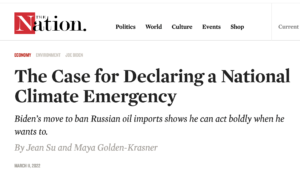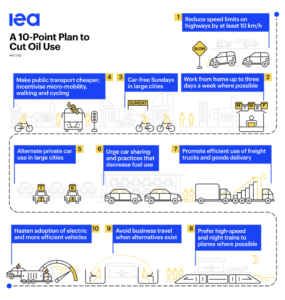Via Axios: https://www.axios.com/russia-crisis-oil-use-703bcc17-1b7c-4ede-9510-e5e8e26ea623.html
Russia crisis spurs push to cut oil use
By Ben Geman
The International Energy Agency just unveiled ideas for quickly cutting oil demand at a time when Vladimir Putin’s war on Ukraine could bring substantial loss of Russian barrels from global markets.
Why it matters: The 10-point plan comes amid IEA warnings that the war could become the biggest supply crisis in decades as countries look to isolate Russia.
- It’s part of a wider reckoning in Europe — Russia’s largest market — and elsewhere over how to curb reliance on Russia while keeping markets supplied and avoiding even greater economic shocks.
Zoom in: The plan says that “immediate actions” in advanced economies could reduce global oil demand by about 2.7 million barrels per day within four months.
They include…
- Reducing highway speed limits by about 6 miles per hour; more working from home; street changes to encourage walking and cycling; car-free Sundays in cities and restrictions on other days; cutting transit fares; policies that encourage more carpooling; cutting business air travel; and more.
The big picture: Russia is the world’s largest combined exporter of crude and oil products combined and the second-largest crude exporter.
- The plan arrives two days after IEA projected that Russian exports could fall by around 2.5 million barrels per day next month and maybe more “should restrictions or public condemnation escalate.”
Our thought bubble: This all seems … maybe hard to imagine? The idea of coordinated adoption of mass behavioral changes on a compressed time frame sounds like an uphill climb.
The intrigue: The report also notes the near-term proposals should be part of wider, longer-term efforts to curb oil demand to help fight climate change and cut air pollution.
- It talks up areas like stronger policies for deployment of EVs, charging infrastructure, home heat pumps and more.
- “Governments have all the necessary tools at their disposal to put oil demand into decline in the coming years, which would support efforts to both strengthen energy security and achieve vital climate goals,” it states.
#
#
IEA report:
In the face of the emerging global energy crisis triggered by Russia’s invasion of Ukraine, the IEA’s 10-Point Plan to Cut Oil Use proposes 10 actions that can be taken to reduce oil demand with immediate impact – and provides recommendations for how those actions can help pave the way to putting oil demand onto a more sustainable path in the longer term. …
If fully carried out in advanced economies, the measures recommended by the IEA’s new 10-Point Plan to Cut Oil Use would lower oil demand by 2.7 million barrels a day within four months – equivalent to the oil demand of all the cars in China. This would significantly reduce potential strains at a time when a large amount of Russian supplies may no longer reach the market and the peak demand season of July and August is approaching. The measures would have an even greater effect if adopted in part or in full in emerging economies as well. …
The new report also includes recommendations for decisions to be taken now by governments and citizens to transition from the short-term emergency actions included in the 10-Point Plan to sustained measures that would put countries’ oil demand into a structural decline consistent with a pathway towards net zero emissions by 2050. …
The short-term actions it proposes include reducing the amount of oil consumed by cars through lower speed limits, working from home, occasional limits on car access to city centres, cheaper public transport, more carpooling and other initiatives – and greater use of high-speed rail and virtual meetings instead of air travel.
Most of the proposed actions in the 10-Point Plan would require changes in the behaviour of consumers, supported by government measures.
The new report also includes recommendations for decisions to be taken now by governments and citizens to transition from the short-term emergency actions included in the 10-Point Plan to sustained measures that would put countries’ oil demand into a structural decline consistent with a pathway towards net zero emissions by 2050.
…
The short-term actions it proposes include reducing the amount of oil consumed by cars through lower speed limits, working from home, occasional limits on car access to city centres, cheaper public transport, more carpooling and other initiatives – and greater use of high-speed rail and virtual meetings instead of air travel.
…
Several of the measures can be implemented directly by other layers of government – such as state, regional or local – or just voluntarily followed by citizens and corporates, enabling them to save money while showing solidarity with the people of Ukraine. …
Using high-speed and night trains instead of planes where possible
Avoid business air travel where alternative options exist
Reinforce the adoption of electric and more efficient vehicles
#
Related:
Climate Depot Morano: “Big Tech does not differentiate between Russia & climate skeptics. (See:Google has demonetized skeptical meteorologist Dr. Roy Spencer’s website for allegedly ‘unreliable & harmful’ climate information)To all of you cheering on Big Tech and corporations banning and de-platforming anything ‘Russian’ right now, you may want to think again. If you ever find yourself on the wrong end of the official state narrative on climate, war or COVID policies, this could be your free speech and your personal bank cards being banned. The coordination and speed of the censorship cancel culture are frightening and will be used against anyone including private citizens who dare dissent. Will electric car drivers one day have their vehicles ‘deactivated’ if their views diverge from the official government claims?!” (See: Elon Musk urged to deactivate all Teslas in Russia, following the country’s invasion of Ukraine)

Nation Mag: ‘The Case for Declaring a National Climate Emergency’ – ‘There is no greater emergency’





